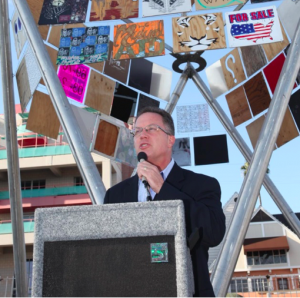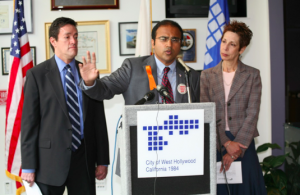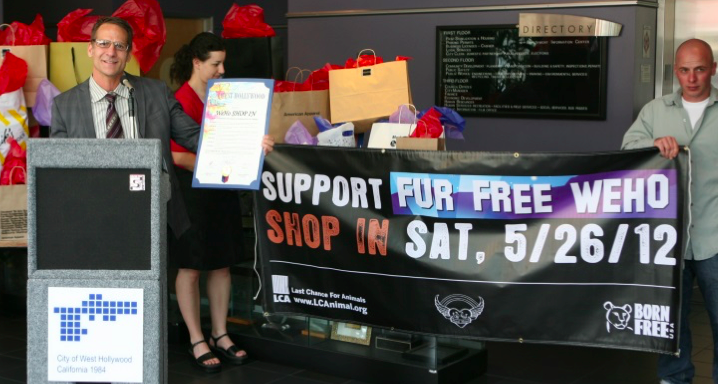Welcome to West Hollywood, the city with its own foreign policy, regardless of what the U.S. Supreme Court says about it.
Today the city enforces a policy requiring contractors to affirm they don’t honor the Arab League’s economic boycott of Israel. One small problem – the high court ruled in 2000 that the policy constitutes a ban against the 22 countries in the Arab League. Such sanctions by cities are unconstitutional because they infringe on the federal government’s authority to set U.S. foreign policy, the court said.
City Attorney Mike Jenkins told “The Washington Times” in 2004 the Arab League boycott provision goes back at least a decade “and agreed that it is a form of sanction, ‘in the sense that it says that we will not contract with you if you honor the boycott. But it is also in keeping with U.S. policy.’”
He further noted that West Hollywood “in keeping with the 2000 court ruling, rescinded its policy affecting those trading with Burma (Myanmar),” according to the newspaper.
Undeterred, city council members switched course and began merely opposing actions by foreign governments. They condemned the jailing of Russian punk band Pussy Riot in 2012, for example.
Most of the 40-plus “foreign policy” resolutions passed so far generally address anti-gay laws or civil rights issues in some 17 countries including the Ukraine, Russia, Uganda, Nigeria, Ghana, the Congo, Iran, Pakistan, Myanmar and Egypt.
One resolution demanded that Japan stop violating international whaling agreements, though, and another opposed the fast-tracking of the Trans-Pacific Partnership that would give the country of Brunei favored trade status with the U.S.
“We do have an extensive foreign policy in West Hollywood,” former mayor Jeffrey Prang told the “Los Angeles Times” in 1997. Prang, who currently is Los Angeles County Tax Assessor, said such resolutions “fill a need” for the city’s 36,000 residents (at that time) to vent their feelings on global issues.
There’s a Domestic Agenda Too
The resolution mill at City Hall doesn’t confine itself to other countries’ business, of course. The familiar saying that “all politics is local” – most commonly associated with former U.S. House of Representatives Speaker Tip O’Neil – doesn’t always apply to resolutions directed at domestic targets.
• West Hollywood was the first municipality to pass a resolution calling for the impeachment of President George Bush and Vice President Dick Cheney because of alleged abuses of power.
 • The City Council condemned a ban on gender-neutral student housing at the University of North Carolina 7 and railed at Sony International and two of its business partners for the “degrading and dehumanizing of women in the video game Grand Theft Auto 3.”
• The City Council condemned a ban on gender-neutral student housing at the University of North Carolina 7 and railed at Sony International and two of its business partners for the “degrading and dehumanizing of women in the video game Grand Theft Auto 3.”
• It asked Google to remove websites that members found offensive and scolded the Salvation Army for alleged anti-gay positions on employee benefits. Council members also made a big to-do about making sure Nabisco employees in Oxnard get plenty of bathroom breaks.
• West Hollywood strongly supports animal rights through policies adopted in several resolutions. A 1989 resolution made the city a “cruelty-free zone” for animals, paving the way for a ban on the sale of fur in local stores that took effect in 2013. Another resolution supported a ballot proposition that led to a statewide standard for the caging of chickens in 2009. The city previously had changed the official wording of “pet owner” to “pet guardian.”
• Corporations that buy leases or drill in the pristine Arctic National Wildlife Refuge are banned from doing business with the city, even though no such company exists. Oil exploration in the refuge is prohibited by federal laws that are vigorously enforced. The city council adopted the ban back in 2002 just in case drilling is ever allowed. It still isn’t.
Since cityhood in 1984, elected officials have adopted nearly 60 resolutions condemning specific individuals, states, countries, corporations and golf courses with which they disagree. Council members nonetheless have declared West Hollywood a “hate-free city.”
News media have mocked the city’s resolutions for many years. A “Los Angeles Times” article from 1997 states, “Flowing out of city offices nearly every month – certainly more frequently and more volubly than the offices of most other city governments – are a slew of resolutions that have little or nothing to do with the nuts and bolts of governance.”
During the 2011 city council election, most candidates were embroiled in the “fur free WeHo” issue. One challenger, Lucas John Junkin, promised that if elected he would call for a ban on the sale of crystal meth pipes instead of fur, eliciting this observation by the “L.A. Weekly:” “John’s pledge is a reaction to the tired West Hollywood tradition among its politicians to pass resolutions that have little to do with the day-to-day lives of WeHo residents.”
A High Level of Self-Esteem
California historian Kevin Star traces an attitude that “everybody has the right to the city council’s opinion about everything” to West Hollywood’s founding in 1984. Gays and seniors – two groups ever vigilant of their individual rights – mostly comprised a population of 36,000 with very few Republicans.
“West Hollywood had a high level of self-esteem,” he writes in his book “Coast of Dreams – California on the Edge 1990- 2003,” which expressed itself in the form of foreign and domestic policies with a decidedly liberal slant. Star says West Hollywood immediately joined the “Hanseatic League of Upper Left California cities,” a reference to a confederation of merchant guilds along the Baltic and North seas in the late Middle Ages. Other cities in the upper left of Star’s California Hanseatic League include Berkeley and Santa Monica.

Rarely does a resolution cause any controversy because of the city’s huge liberal voting majority. With about 25,500 registered voters in 2012, roughly 15,500 were Democrats, slightly more than 2,500 were Republicans, and 4,500 had “no party preference,” according to the California Secretary of State’s office. Resolutions are included in the “consent calendar” that’s pre-approved unanimously.
Former Mayor Sal Guarriello, a liberal Democrat, once joked that West Hollywood is a city whose politics run so far to the left that he was sometimes labeled a conservative.
Paul Koretz, previously a council member and currently on the Los Angeles City Council, reinforced Star’s analysis in news media interviews. He said early residents – many of them gay – moved to West Hollywood prior to cityhood, believing the Sheriff’s Department, which handles law enforcement on a contract basis, wouldn’t be as tough as the Los Angeles Police Department, which tended to harass gay people.
He also noted that West Hollywood, as an unincorporated community, didn’t have the same building restrictions as Los Angeles, and it became overbuilt. Many apartments soon deteriorated into lower rent units, drawing in a large senior citizen population on fixed incomes. Many of those gays and seniors are concerned with national bread-and-butter issues, providing a strong constituency for the human rights, environmental and economic issues underlying many resolutions, Koretz explained.
A staff report accompanies each resolution that, among other things, explains how the resolution conforms with city goals. The Trans-Pacific Partnership with Brunei resolution, for example, supports the core values of “Respect and Support of People” and strategic programs like “Actively Participate in Regional Issues.” The staff report also notes that the resolution is consistent with General Plan goals of “Maintain and Pursue Social Policies and Social Services that Address the Needs of the Community.”
Domestic Rights Initiatives
The city councils has adopted about a dozen resolutions since 1995. A recent example is the 2015 resolution denouncing Indiana’s Religious Freedom Restoration Act. It directed the city manager to immediately suspend official travel to Indiana and any other state that adopts similar legislation until the law is revoked.
“In 1985, the City of West Hollywood was one of the first cities in the country to adopt a Domestic Partnership Ordinance and it was one of the first cities in the country to pass a resolution in support of marriage equality, paving the way for same-sex marriage initiatives all over the country. Today, many of the City’s landmark ordinances have been duplicated and have become mainstream policies nationally and globally,” a city new release states.
The city marked a milestone in 2014 when it reached 10,000 couples as registered partners.
Handgun Control
At least 45 resolutions since cityhood have supported a wide range of gun control initiatives. They have called for a ban on the sale of cheap handguns or Saturday night specials, outlawing cop killer bullets, a zero tolerance policy for gun possession within city limits and legislation allowing cities to regulate the sale and use of firearms.
A somewhat unexpected success came in the mid-1990s when West Hollywood adopted an ordinance that made the city the first in the state to ban the sale of cheap handguns. Even though the ban was a symbolic gesture because guns are easily accessible across city limits, 33 other California cities used West Hollywood’s ordinance as a model, creating a wave of support that went all the way to Sacramento. The state Legislature passed a bill that sided with the cities’ position and sent it to then Gov. Gray Davis for his signature. Davis vetoed the bill, but West Hollywood scored a big victory nonetheless because the legislation only happened because the city took the chance and battled interest groups to get as far as it did.

Cuba Resolutions & the Sister City Initiative
Long before the U.S. acted to normalize relations with Cuba last year, West Hollywood adopted resolutions in the early 2000s focusing on relations with the Caribbean nation. In 2002, the city called for an end to the U.S. economic embargo against Cuba,24 while a resolution in 2000 supported lifting federal restrictions on travel to the Communist country.
It just so happened that about that time city officials were trying to develop a sister city relationship with a yet-to-be-named municipality in Cuba. A city delegation led by former mayor Steve Martin winged its way to Havana in 2000 hoping for a solid start to the effort.
Martin singled out Havana for such a partnership, saying, “Havana has a vibrant night life, which West Hollywood is known for. We hope to pair up with a city that has flourishing arts, music and architecture. An artists’ exchange could really add something culturally to West Hollywood,” Martin said in a “Los Angeles Times” article from 2000.
Back home, though, some residents wondered why a gay-friendly American city would seek out a relationship with a country that had a history of intolerance of gays and lesbians, especially since West Hollywood had spent so much time scolding many countries for their anti-homosexual policies.
“This is a local municipality and the council is always making proclamations on foreign policy,” West Hollywood resident James Fuhrman said in a 2000 “Los Angeles Times” article. “In the meantime, the San Vicente Park pool may not be open in time for summer, and business owners are struggling because of the construction on Santa Monica Boulevard. I think the council has good intentions, but their main goal is to get a free trip to Cuba. Local concerns should be their first priority.”
The council appointed a sister city committee in 2002 to guide the effort. It reported back the following year, recommending three European cities for relationships. Two were selected for further discussion: Vienna, Austria, and the Republic of Georgia city Kabuleti, situated on the eastern coast of the Black Sea. Nothing ever came of the effort after years of back and forth debates about an appropriate foreign city to link up with.
Corporations and Labor Unions
The city council has supported boycotts against Exxon over its environmental record; Shell Oil because it was heavily invested in South Africa during apartheid; Coors Brewing Co. because of Coors’ family members anti-gay positions; and Gallo Wines over worker claims of mistreatment. It also urged the state to place a moratorium on hydraulic fracturing, widely known as fracking, for oil drilling.
Likewise, elected officials have passed resolutions supporting a United Farmworkers strawberry strike in 1996 as well as a strike last year by workers at Driscoll, a California company that’s the world’s largest berry distributor. It also supported the SAG/AFTRA strike in 1996.
The council denounced Southwest Airlines for its “people of size” policy and condemned the Augusta National Golf Club for discriminating against women.
It called for Target and Best Buy to change their campaign contribution policies to prohibit supporting candidates opposed to equality for the LGBT community.
Elected officials also have favored a constitutional amendment to end “corporate personhood,” which is a legal notion that a corporation has some, but not all, of the legal rights and responsibilities enjoyed by natural persons (physical human beings.
Since the Supreme Court’s ruling in Citizens United v. Federal Election Commission in 2010, upholding the rights of corporations to make political expenditures under the First Amendment, there have been several calls for a U.S. Constitutional amendment to abolish Corporate Personhood, even though the Citizens United majority opinion makes no reference to corporate personhood or to the Fourteenth Amendment.

Really, Plumber? You need our 5 West Hollywood City Council members to pass resolutions on world issues to expand your horizon and think about life outside West Hollywood? Well in that case they should continue. I wonder what their stance on snowpocalypse is?
Greenie, yes that is my understanding as well. Our representatives are elected by far less than 10% of the residents. Obviously any decent local government serves all residents, visitors and businesses, after all they are the ones paying for everything, including their healthcare, pension and perks.
A resident is a local or inhabitant that lives somewhere on a long term basis. Where as a constituent is voter or elector.
@Rudlof: I believe constituents come to learn and appreciate the circumstances and interests of competing arguments about state, federal and international issues through extended discussions and deliberations. Thankfully, our City Council provides a forum for constituents to think about issues which directly affect them. Grateful are we who are encouraged to think outside our 1.9 square miles and reflect on issues that concern ourselves and others.
@Rudlof: I believe constituents come to learn and appreciate the circumstances and interests of competing arguments about state, federal and international issues through extended discussions and deliberations. Thankfully, our City Council provides a forum for constituents to think about issues which directly affect them. Grateful are who are encouraged to think outside our 1.9 square miles and reflect on issues that concern ourselves and others.
@Rudlof: I believe constituents come to learn and appreciate the circumstances and interests of competing arguments about state, federal and international issues through extended discussions and deliberations. Thankfully, our City Council provides a forum for constituents to think about issues which directly affect them. Grateful are we who are encouraged to think outside our 1.9 square miles and reflect on issues that concern ourselves and others.
@Rudolf: I believe we want to have informed individuals. Informed individuals can come to learn and appreciate the circumstances and interest of competing arguments through extended discussions and deliberations. Thus, the Council’s positions on state, national and international issues helps develop an informed West Hollywood.
@Plumb: I wish our council kept it local. I’m mystified why you find my choice of words interesting.
@Rudlof: All politics are local. It is interesting that you said “residents” and not constituents.
Calling for reversal of Citizens United nationwide while preventing any meaningful campaign finance reform at home is not credible. Can we pass a resolution that calls for the immediate end to resolutions that do not directly affect the residents of West Hollywood?
i wonder how some of the young people who have been assaulted would have like to have one of those ‘cheap’ handguns? goodness knows that obody else will protect them. how about outlawing the mistreatment and ignoring of the poor homeless souls who are scattered about town? and as for george bush, and war crimes…just remember that jfk & lbj policies led to the death of 58,000 boys in viet nam. kind of makes w and cheney look like pikers. oh, and how about fdr and his war council who knew about the nazi death camps and decided not to… Read more »
…and, about our sidewalks? Are our storm drains ready for an El Nino onslaught? Then, there’s…